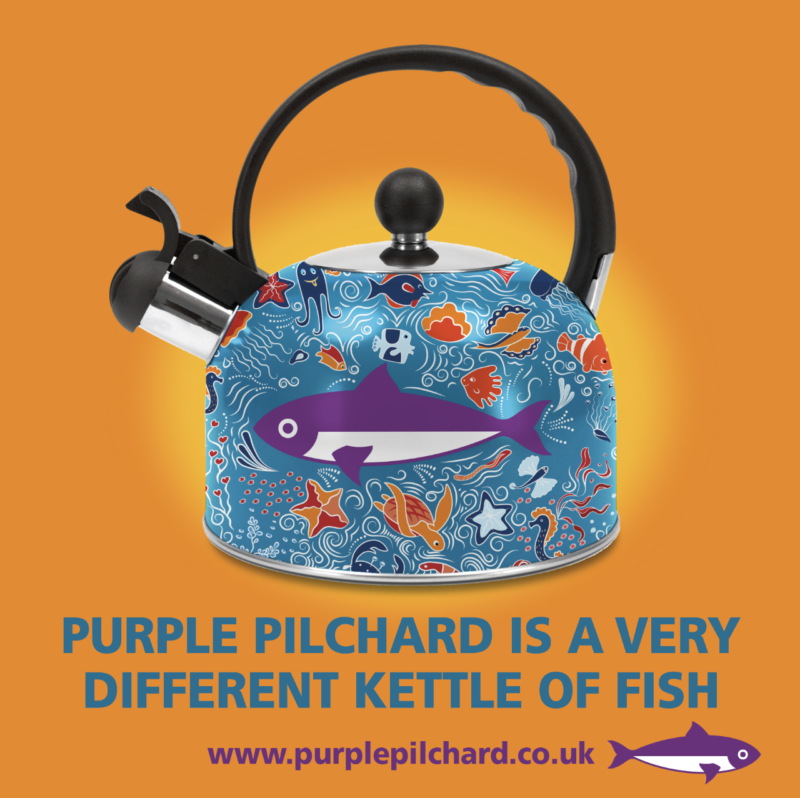Purple Pilchard set sail in 2004. From the beginning there was no big vision or compelling call to arms, just a niggling suspicion that intriguing, cash-strapped foodie SME’s (start-ups, disruptors, underdogs…..) run by overstretched yet ambitious founders could do with easy access to ‘everyday affordable’ marketing during those all-important formative months and years.

Eighteen years down the line I am so proud that I jumped off the corporate bandwagon and aligned myself with a multitude of young, bustling brands that are stretching every sinew to be part of our nation’s rapidly evolving landscape. Today inquisitive SMEs have more scope than ever to carve out distinct and profitable niches whilst reminding major manufacturers that it’s no longer acceptable to settle for beige, ‘one-size-fits-all’ category solutions. Thankfully the advent of alternative online/ D2C forums means that even supermarkets can’t rest on their laurels and give all their coveted shelf-space to dreary mass market solutions, which is why explorative initiatives like Sainsbury’s Future Brands, Co-op’s local sourcing programme, Product Guru (and so many other nurturing brand initiatives) can only be applauded.
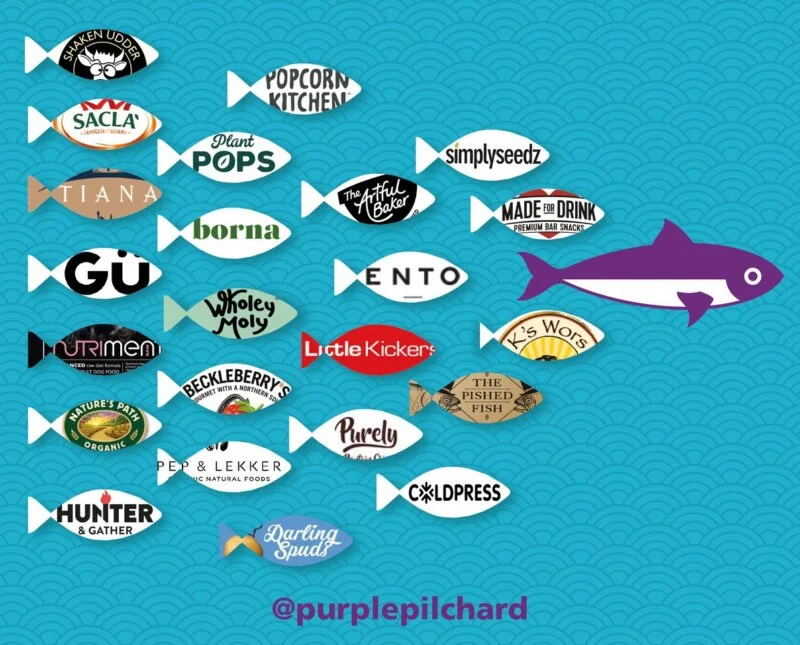
Pilchard is an incubator agency for emerging food & drinks brands of tomorrow that helps cash-strapped/time-poor brands create positive noise to help them stand proud from the crowd.
Going back 25 years I probably thought I’d own just such a small business today, but whilst the idea remains enticing, I have neither the grittiness or nerve to go through what I’ve seen my amazing clients do in terms of coping with lost listings, packaging setbacks, product recalls, broken investment pledges….. I enjoy my stress-free downtime too much! And yet, working with such inspirational food pioneers, provides a buzz like no other, especially knowing that in some small way you’re helping them look bigger than they are and as such deserving of a second glance or a small punt.
Much has changed since I started out in marketing. In the old days launching a new food or drink start-up was the preserve of successful business people who’d spent years establishing crucial contacts whilst putting aside a significant war chest of funds and experience to make their pet project a future reality. Yes, there are still swathes of city types and lawyers looking to enjoy a better life/work balance whilst bringing their unique idea to life but more and more I see young dynamic founders who’re only too happy to cut short their time in ‘blue chip’ world to bring their cracking idea to life. The advent of online, social media and an altogether more receptive consumer mindset means there’s no time to hang around, because if you don’t fill the missing consumer need void, someone else certainly will! Fortunately today for a relatively small stash of cash it’s perfectly plausible to create a new product, give it a compelling identity and forge an assured voice before heading to market.
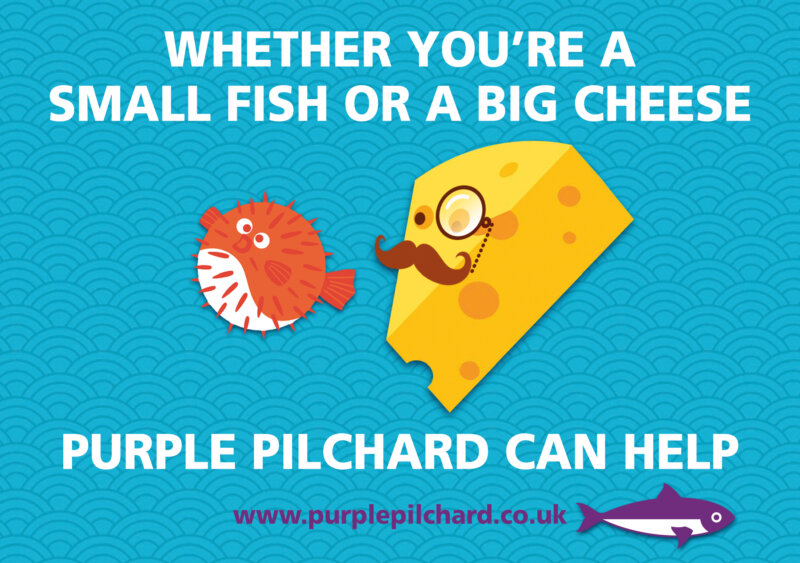
It’s also worth remembering that a great idea doesn’t need to be something completely new, it could simply be a small matter of revisiting a tired category and making something infinitely better; be that an uncompromising ingredient peanut butter (Pip & Nut) a biscotti that doesn’t break your jaw (The Artful Bakers), salmon infused with alcohol and botanicals (The Pished Fish) or a clean-deck soda (Dalstons).
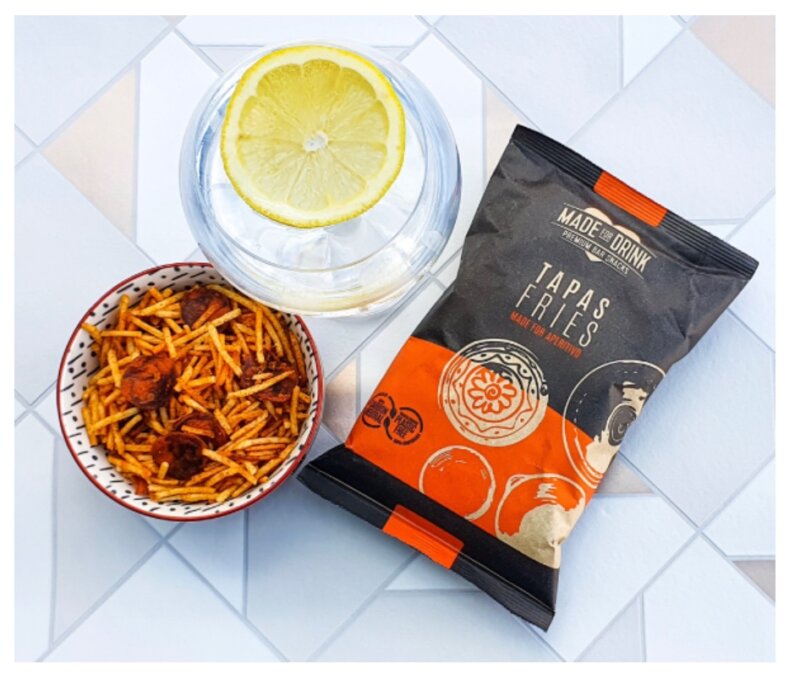
Much has changed since I started out in marketing. I began in blue chips because it made my parents happy that marketing might be a sensible career path. I didn’t have the luxury of a graduate scheme entry, because unlike most of my peers I wasn’t from Oxbridge or a Russell Group university and my Modern History & International Relations degree didn’t have my marketing director purring with excitement. In fact the only thing he said that I bothered to remember was his curious observation that they’d never had a ‘red bricker’ in the team.
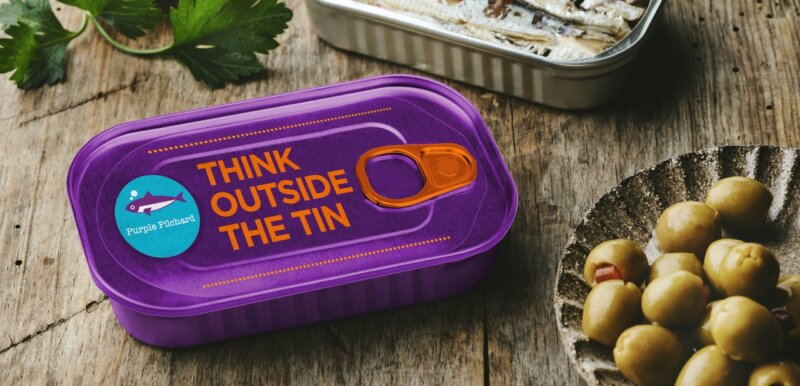
It’s fair to say that my initial impressions or corporate marketing (across an array of categories) was somewhat underwhelming. Short-term fixated bosses, an unhealthy obsession with data to make even the most miniscule decision and in-built timidity to accede to supermarket whims. This was probably the moment I realised that corporate life and I were a poor fit. My salvation came a few jobs down the line in the shape of little-known start-up Ben & Jerry’s and a rather a minimalist portacabin in Egham. Ben & Jerry’s was a seminal moment in my marketing career since it showed me that a self-assured yet nimble under-financed underdog with an air of mischief, a compelling tone of voice and a compassionate outlook (Ben & Jerry’s are the original architects of Caring Capitalism) could run rings around a well-financed, starchy market leader that made little or no effort to connect with its customers. Here I was immersed in a team and an operation that wasn’t averse to taking calculated risks or working with smaller, edgier more risk-taking agencies.
Initiatives like The Friends of The Girth, Veals on Wheels taxis, parking our Flying Friesian scoop bus outside our rival’s head office and the sponsoring of obscure yet honest World Championships (including Nettle Eating, Toe Wrestling & Bog Snorkelling) that lived the brand’s quirky persona whilst running circles around a wary rival suffocating in red tape and indecision.

My next two excursions into fleet-footed organic and coeliac friendly businesses opened my eyes to the fact that not only were consumers demanding ‘real’ choice like never before, but that big businesses were for the most part ill-equipped to drive thoughtful/game-changing innovation.
When I started out an authentic category pioneer like Innocent Drinks (pre-Coke buyout) was a playground that few marketers could enter. Today agitating disruptors are here, there and everywhere playing their part in shaping tomorrow’s food aisles. Buyers can no longer offer polite lip service and deserving minority food interests (vegan, keto, good gut health…) can no longer be ignored or overlooked.
BETTER COMMUNICATION
What I most like about today’s food & drinks landscape is how its geared to transparency and sincerity like never before. Brand loyalists want to bond with their brand heroes which is why consumers lean towards larger-than-life founders with vocal opinions and clear agendas.
Multi-national blandness is no longer a meaningful currency. It’s amazing how many dreary overtly formulaic press releases are doing the rounds because some set-in-ways scribe has told them this is is the right way things have always been done. Although on the flip-side there are plenty of have-a-go founders who think their unrivalled understanding of their brand means they’re better placed than anyone to assemble the brands communication. This is a laughable conclusion as many people are not natural writers and don’t even have a good grasp of grammar. You wouldn’t pop on a Mac and have very crack at designing a brand identity so why does everyone think they’re the next JK of brand story telling? There’s also the point that most people struggle to write upbeat stuff about themselves as a ‘modesty valve’ prevents a majority of us from getting too carried away. Writing about someone else’s amazing business acumen is far less uncomfortable and this will come across in any resulting article. There’s also there’s the all-too common banana skin factor of founders often being too close to their brand. Pilchard has always prided itself on a ‘straight-talking,’ stance that works out in most instances (but not all!) and in those instances at least no time is wasted stepping nervously over egg shells.
Pilchard deals in common sense communications and rejects empty noise, pointless peacocking or random soundbites. Having been up & running for almost 20 years I thought I’d pass on a few tips:
Pick Your Moments Wisely: Always have an underlining motive as to why you’re raising your head above the parapet. There’s a limit to how many moments in the sun a small disruptor will secure so pick your moments to strike wisely (leave editors and readers wanting more).
Humility At All Times: It almost sounds too obvious to mention but it’s amazing how easy it is to sound smug or brash.
Don’t Knock Others: It doesn’t sit well! Your success isn’t dependent on others looking bad
Include A Element of Social Responsibility (if you can!): It’s not compulsory but it leaves a good taste and is the right thing to do.
Speak From The Heart: Brand loyalists like to immerse themselves in the full brand. You might feel uncomfortable dwelling on the low points but it says more about you if you don’t focus just on how ‘amazingly well without hiccups,’ your brand journey has gone. PR is essentially story-telling and without the lows you can’t truly appreciate the highs.
The Local Pride Factor: Why ignore those people most likely to have a natural affinity with your brand? I encourage all brands to take pride in their local geography, because who doesn’t warm to a food hero on their doorstep.
Challenge The Status Quo (its OK to be different!)
I have a client (Made for Drinks) that makes snacks of a truly decadent Friday night snacks. To many championing such products in a healthier living world when HFSS is the buzz phrase in town might seem a little unwise and yet indulgence will never go out of fashion and there’s no shame in zigging whilst everyone else zags.
Regularly Revisit Your Hierarchy of Messages
I had a cereal client who was insistent that it was their organic-ness that enabled them to stand out from the crowd and whilst such a stance might have gravitas within its home market, here in the UK, organic has not only struggled to escape its elitist pre-conceptions. It is also increasingly redundant when considering our country’s unrivalled commitment to ingredient & label integrity. This was a brand floundering in the UK until we encouraged them to flip their messaging, in other words lead with their coeliac credentials whilst retaining organic as a secondary reaffirmation of quality.
Always Ask Questions
People have natural inbuilt inclination to help others so never be stand-offish, guarded or timid!
Brand On A Page
No marketer should forego having a single brand page that encapsulates a brand’s DNA (brand idea, distinguishing beliefs, how you want brand loyalists to feel). It should be a daily ritual to read this document to ensure you’re on track because if you aren’t in tune with your essence why should anyone else be?
Finally never forget that disruptor marketing isn’t rocket science, its merely a passport to push boundaries!
https://www.linkedin.com/in/ian-hills-1266075
@purplepilchard
TSF Reporters
The Successful Founder Magazine is the go to feature-rich magazine for founders on all stages of their entrepreneurship journey .
- TSF Reporters



